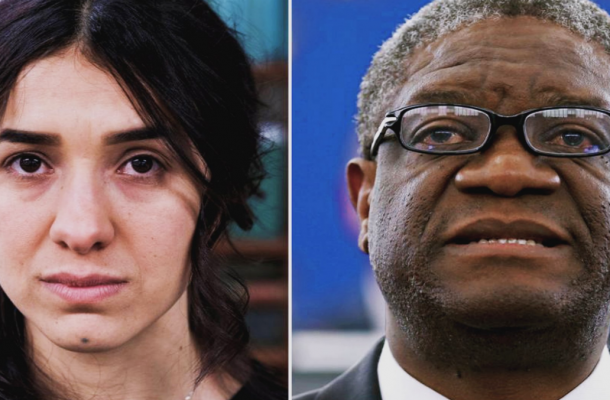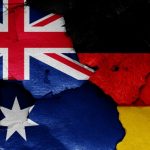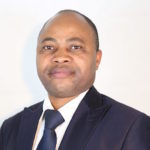Ending sexual violence as a weapon of war

The 2018 Nobel Peace Prize has been awarded to Nadia Murad and Denis Mukwege in recognition of their personal struggles to end the use of sexual violence as a weapon of war and armed conflict.
Both have spoken truth to power about the scourge of rape, sexual slavery and abuse affecting women and girls, in particular in Iraq and the Democratic Republic of the Congo.
As in 2017, when the award was given to the International Campaign to Ban Nuclear Weapons for its activism on the nuclear weapons ban treaty, this year it also went to activists rather than to powerful political leaders.
This decision of the Norwegian Nobel Committee speaks volumes about whose agency matters and needs most support in world politics. It bears witness to all those victims who survive without substantial justice or reparation, and recognises human rights defenders and peace activists around the world who have been working to end the impunity for the use of sexual and gender-based violence by armed forces.
Individual leaders
Nadia Murad escaped enslavement including gang rape by Islamic State of Iraq and the Levant (ISIL) forces in Northern Iraq in 2014. She and others from her village were taken captive and sold repeatedly for sex as part of the militants’ slave trade. Nadia took the risk to escape not knowing if she would survive.
Of the 7,000 women and girls kidnapped by ISIS, 1,300 remain trapped in sexual slavery. Nadia survived this ordeal to tell her story to the world, drawing attention to the genocide of her people – the Yazidi minority – by ISIL.
She refused to be shamed by her victimisation and to cover her identity and face when giving testimony. After her speech at the United Nations in 2016, she said: “Deciding to be honest was one of the hardest decisions I have ever made, and also the most important.”
Denis Mukwege has worked as a doctor and established a hospital in an impoverished corner of the Congo to help repair the bodies and lives of female survivors of conflict-related rape.
He was a refugee who fled violence in the Eastern Congo in 1996. In 1999, he treated 45 women when they arrived at the hospital having survived brutal torture: repeated rapes followed by being shot in the genitals and/or being set on fire. These rapes were committed by Congolese troops, Rwandan troops and other rebel militias.
As a humanitarian, he had a choice: to provide clinical care and remain ‘impartial’ and ‘neutral’ on the rights abuses he was witnessing, or to speak out. He contacted Médecins Sans Frontières and spoke out. He took pictures, recorded testimony and from then on became a human rights defender. In his words, “the goal is to transform…pain into power, we can change hate by love. What is keeping me going is really the strength of women.”
Symbols for movements
Both Denis and Nadia are part of something bigger than themselves. They have been pulled by forces greater than themselves to seek justice, but this still takes immense personal courage. They tell their stories because it is the only weapon they have and because these are stories that need to be told.
The Nobel Peace Prize recognises this individual courage and sacrifice within the collective movement for a more just and peaceful world. As Margaret Mead said: “Never doubt that a small group of thoughtful, committed citizens can change the world; indeed, it’s the only thing that ever has.”
Nadia and Denis are proof that individuals matter. When we speak of ethnic minorities being targeted for genocide and ethnic cleansing, they are not just numbers in a refugee camp; they are Nadias. Nadia’s public engagement, her testimony and her refusal to be silenced is earth-shattering.
Similarly, Denis’ campaign to bring attention to the appalling sexual violence perpetrated in the Congo and his demand that the perpetrators be prosecuted and reparations be paid to victims has defied all opposition.
Denis has been physically attacked for speaking out on the treatment he provides. His children were taken hostage and he confronted near-murder in 2012 and continuing death threats for his campaign.
Reordering Power
As Myanmar and Syria show, impunity remains widespread. Power is still held by those who wield violence. Sexual and gender-based violence often precedes and anticipates the outbreak of conflict and makes peace even more difficult to achieve. These two individuals – one who treats victims of violence and one who survived the violence to seek justice – are redefining power. They have demanded to be heard.
As Cynthia Enloe reminds us, it takes enormous power “to keep people on the ‘bottom rungs’ where they cannot be heard.” When the Nobel Committee awards individuals who defy acceptance of impunity for sexual violence – and who defy the social norm that women and men must not speak of the violence and injuries that they suffered as a result of this violence – it gives power back to these people.
The Nobel Peace Prize is a reminder of who has the power to change the world. Denis and Nadia follow recent winners like Malala Yousafzai, Kailash Satyarthi, Tawakkol Karman, Leymah Gbowee and Ellen Sirleaf Johnson. These individuals have changed how we view the right to education, women’s participation in peace processes, the right to freedom of expression and impunity for crimes of sexual violence.
Human rights defenders, not celebrities
Denis and Nadia are not celebrities; they are courageous human rights defenders. They have lived through violent attacks on themselves and know that others continue to suffer. The Nobel Peace Prize will add even more weight to their voices.
It can be hoped that Nadia’s voice will give courage to others to come forward to testify so that appropriate guilt and consequences can follow. Nadia has said that, more than anything else, “I want to be the last girl in the world with a story like mine.”
Denis’ example will encourage other men to join the movement against male violence whether in conflict or peace: “It’s not a woman question, it’s a humanity question, and men have to take responsibility to end it”.
This article was written by Betty Barkha, a PhD candidate at the Monash Gender, Peace and Security Centre, Dr Sara E. Davies, an Australian Research Council Future Fellow and Associate Professor at the Centre for Governance and Public Policy in Griffith University and Professor Jacqui True, Director of the Monash Gender, Peace and Security Centre and an Australian Research Council Future Fellow at Monash University. The article was published by the Australian Institute of International Affairs.
Jacqui True is Professor of Politics and International Relations and an Australian Research Council Future Fellow at Monash University. She is a specialist in Gender and International Relations.














